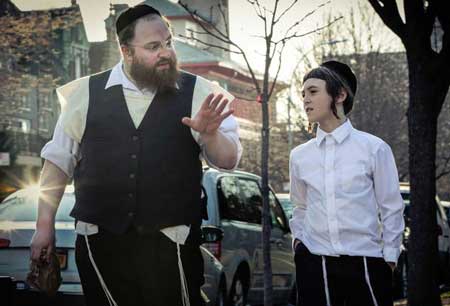Film (2017)
Directed by Joshua Z. Weinstein
Screenplay by Alex Lipschultz, Musa Syeed, Joshua Z Weinstein
Film editing by Scott Cummings; Cinematography by Yoni Brook, Joshua Z. Weinstein; Music by Aaron Martin, Dag Rosenqvist
Kendall Square Cinema, Cambridge, MA
West Newton Cinema, Newton, MA
With Menashe Lustig (Menashe), Ruben Niborski (Rieven)

Ruben Niborski as Rieven
in “Menashe”
Photo: Federica Valabrega
Courtesy of A24 Films
Menashe (Menashe Lustig), a Skver Hasid in Borough Park, Brooklyn, and a widower in his thirties, is now the single parent of a nine-year old son, Rieven (Ruben Niborski). The community’s judgment of such a situation is harsh. Not only do they frown on a single father raising children on his own, but they regard the somewhat atypical Menashe, a grocery clerk with a bit of chutzpah, as a kind of schlemiel who, despite the prevailing judgments about his state, does not personally cultivate confidence and respect among members of the tightly knit community.
But Menashe is much more self-possessed than he seems to members of the community and strives, within the strict confines of his life, to gain their respect. Ultimately, his search is one for self-reliance and self-determination in a way that expresses sensitivity to the culture within which he lives and within which he must raise his son.
This in some ways simple, but superbly done, film is the first full-length narrative outing for thirty-four year old director Joshua Weinstein who previously had made documentaries but no fictionalized, narrative films.
Somehow Weinstein, a secular Jew from New Jersey, got a bug to do a film about the Hasidim, and, as he says, he put on a yarmulke, went into Brooklyn day after day, and gradually got to know the people whose way of life he wanted to portray.
After awhile he began to look for actors within the Hasidic communities across Brooklyn and happened upon Menashe Lustig, a member of the Skver Hasidic community who had done some amount of acting, locally, in Hasidic commercials. A bond immediately formed between them. Weinstein not only was so taken with Lustig’s charisma and acting ability, but was so taken by his own story that Weinstein decided to write his screenplay based on Lustig’s life.
Essentially, the story of Menashe is a slightly modified version of Lustig’s. Lustig is, indeed, a widower with a young son, and had, in fact, confronted community opposition to his rearing his son as a single father. And, as Weinstein puts it, though some of the details have been changed, the emotional core of Lustig’s life story remains the same in the film.
Indeed, Lustig is a charismatic star, and his co-star, the young Ruben Niborski who plays his son Rieven, is also a wonderful, compelling screen presence. Their chemistry is palpable, and the relationship they convey is touchingly immediate.
Though the substance of the plot seems minimal – whether Menashe can raise his son or not, or whether he can find a suitable wife to reconstitute a household with in time to keep his son at home – it really does pack a punch and does convey a strong sense of drama. Each little gesture has significance, and the culmination in Menashe’s preparation of a memorial luncheon in honor of his wife is pretty moving.
The scene of that luncheon includes the local rabbi and the way in which it unfolds is unexpected and quite moving. What had transpired in anticipation of it regarding the imposing threat of Menashe’s dead wife’s brother as Rieven’s foster parent takes a substantial and interesting turn.
As Lustig puts it, the film is meant to be positive, informative and sympathetic, not critical of any one side. And, as Weinstein puts it, there are no bad guys in the film, just a bunch of conflicting viewpoints.
In the end, the film accomplishes exactly that, and does so beautifully, with grace and wit.
The effort, by the way, is unexpectedly multicultural is a few different ways: a Muslim friend and colleague of Weinstein, Musa Syeed, co-wrote the script; and, people from different Hasidic sects all over Brooklyn acted in the film.
The film is almost entirely in Yiddish, with subtitles, one of the few full-length narrative films in Yiddish to have been made in the last seventy years.
Sharon Rivo, Executive Director of The National Center for Jewish Film at Brandeis University, clarifies that “though there have been scattered attempts at producing full-length Yiddish films in France, Canada, Israel and around the world in recent decades, the dominant and most fertile period of Yiddish film production was in Poland and the United States in the 1930s.”
Weinstein felt strongly that it was important to do the film in Yiddish and though not a Yiddish speaker himself worked energetically with his fellow scriptwriters, with Lustig and the other actors, and with a team of translators to make sure that the script was carefully hewn between English and Yiddish in a way that enabled him to control the narrative but which gave Lustig and others some opportunities for improvisation as the need arose. In any case, the script and its translation were carefully overseen and deliberated.
The soundtrack by Aaron Martin and Dag Rosenqvist is simple but moving, emblematic of the film itself, an unexpected small masterpiece, an honest and riveting portrait of an everyman within a tightly knit religious community.
Leave a Reply